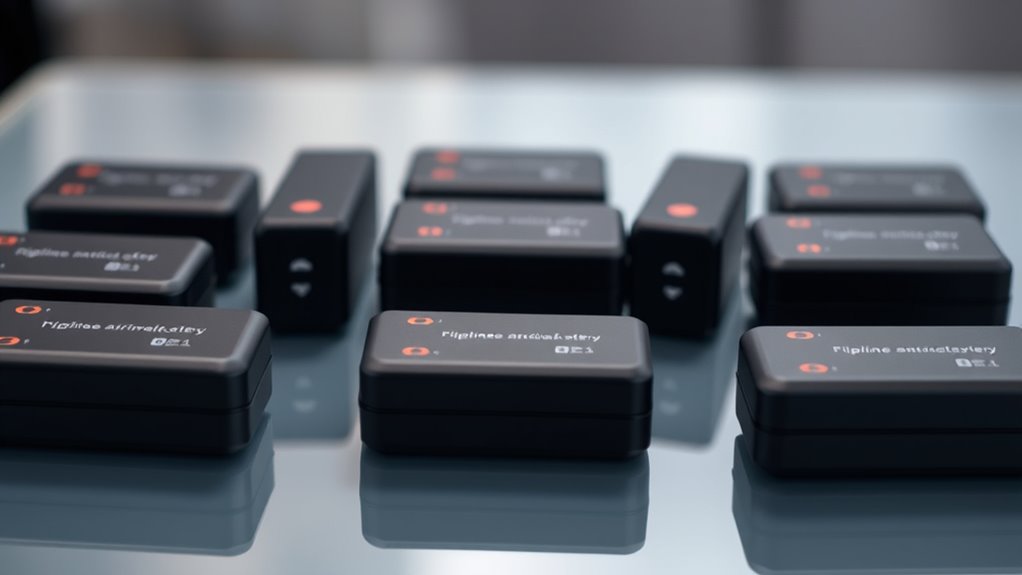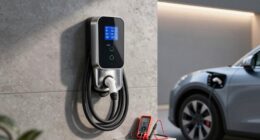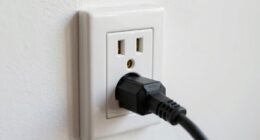When choosing airline-approved battery packs for medical devices, I look for reliable options with capacities under 160Wh and proper safety features like protections against overcharging and short circuits. Brands like the Freedom CPAP Backup, EASYLONGER models, and Krisdonia Power Bank offer safe, durable, and portable solutions that meet airline regulations. They also support fast charging and device compatibility. If you keep these factors in mind, you’ll find the best options to guarantee safety and reliability during travel.
Key Takeaways
- Choose batteries under 100Wh for simple airline approval, or 100-160Wh with airline approval and proper documentation.
- Opt for Lithium Iron Phosphate (LiFePO4) models for enhanced safety, durability, and multiple charge cycles.
- Select TSA-approved, TSA-compliant batteries with safety features like overcharge and short-circuit protection.
- Prioritize compact, lightweight power banks with multiple recharging options (USB-C PD, AC, solar) for versatile travel.
- Ensure device compatibility and proper labeling to meet airline regulations and guarantee safe, reliable power for medical devices.
Freedom CPAP Battery Backup Power Supply (160Wh)

If you rely on a CPAP machine and need a reliable backup power source, the Freedom CPAP Battery Backup Power Supply (160Wh) is an excellent choice. It offers portable, rechargeable power, perfect for travel, camping, or emergencies when AC power isn’t available. Weighing just 3.7 pounds and compact enough to carry easily, it’s compatible with popular models like ResMed AirSense and Philips DreamStation. The 160Wh lithium-ion battery provides flexible runtime, especially when heating functions are disabled. It includes an LED indicator to monitor power levels and comes with an AC charger. Designed for safety and convenience, it’s backed by a 1-year warranty and support.
Best For: individuals who rely on CPAP therapy and need a portable, reliable backup power source for travel, camping, or emergency situations.
Pros:
- Lightweight and compact design weighing only 3.7 pounds for easy portability
- Compatible with popular CPAP models like ResMed and Philips DreamStation
- Rechargeable lithium-ion battery with LED indicator for monitoring power levels
Cons:
- Some models require a separate 14V output cable not included in the package
- Runtime may be limited based on CPAP pressure settings and heating features
- Must verify airline policies before traveling with the battery power supply
EASYLONGER CPAP Battery Backup Power Supply (ES960)
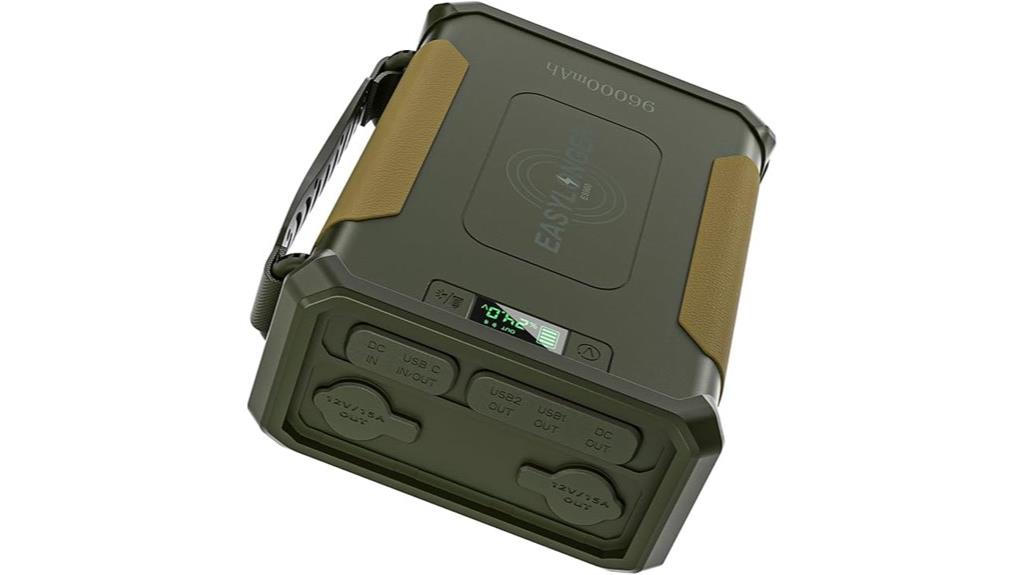
Looking for a reliable backup power source for your CPAP machine during outages or outdoor adventures? The EASYLONGER CPAP Battery Backup Power Supply (ES960) offers 297.6Wh of high capacity, compatible with popular models like AirSense 11, AirMini, and DreamStation. It provides over two nights of use when humidifier and heated tube are off, making it ideal for camping or emergencies. With seven ports and wireless charging, it powers CPAPs and portable devices alike. Built with LiFePO4 cells, it’s safe, durable, and capable of withstanding high temperatures. Recharging options include a Type-C PD charger, AC adapter, or solar panel, ensuring continuous power whenever you need it.
Best For: individuals seeking a reliable, portable backup power source for their CPAP machine and portable devices during power outages, camping, or outdoor activities.
Pros:
- High capacity of 297.6Wh supporting over two nights of CPAP use with humidifier off
- Compatible with a wide range of CPAP models and offers multiple charging options including Type-C PD, AC, and solar panel
- Built with LiFePO4 cells ensuring safety, durability, and resistance to high temperatures with approximately 3000 battery cycles
Cons:
- Requires separate purchase of specific DC cables and accessories for certain device connections
- Solar panel charging not included, which may limit off-grid recharging options without additional investment
- Hefty weight and size may reduce portability compared to smaller, lighter power banks
Backup Power Supply & Travel Battery (2nd Gen) with Swappable 150Wh Cell Pack
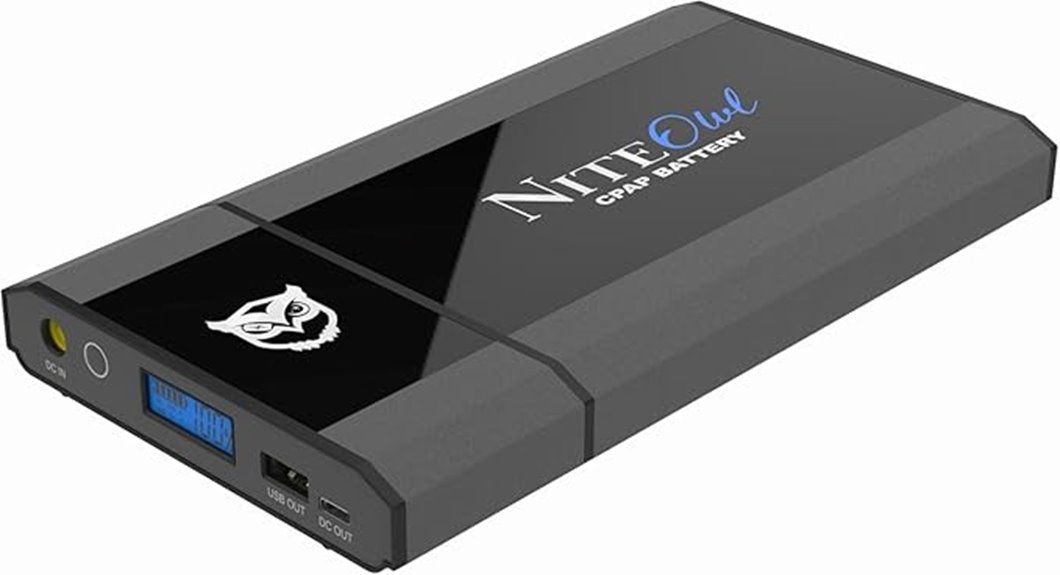
The Backup Power Supply & Travel Battery (2nd Gen) with Swappable 150Wh Cell Pack is ideal for CPAP users who need reliable, portable backup power during travel or camping. Its compact design (8.7 x 4.8 x 0.9 inches, 3 pounds) makes it easy to carry, while the swappable 150Wh cell pack allows extended runtime without limits. Compatible with popular CPAP devices like ResMed, Philips, and React Health, it uses your existing AC power supply for charging—no extra charger needed. FAA-approved and travel-ready, it provides peace of mind, ensuring continuous therapy on the go. The device’s reliability and ease of use make it a top choice for portable backup power.
Best For: CPAP users, campers, and travelers seeking a reliable, portable backup power source to ensure uninterrupted therapy and device operation on the go.
Pros:
- Compact and lightweight design for easy portability during travel and outdoor activities.
- Swappable 150Wh cell pack extends runtime without limits, providing flexible power options.
- Compatible with a wide range of popular CPAP devices and uses existing AC power supplies for charging.
Cons:
- Only one nonstandard battery included, which may require careful handling or replacement.
- Limited to 150Wh capacity, which may not be sufficient for extended use without swapping or recharging.
- First available date listed as April 28, 2025, indicating it may be a future release or pre-release product.
Krisdonia Portable Laptop Charger (TSA-Approved) 27000mAh 130W Power Bank
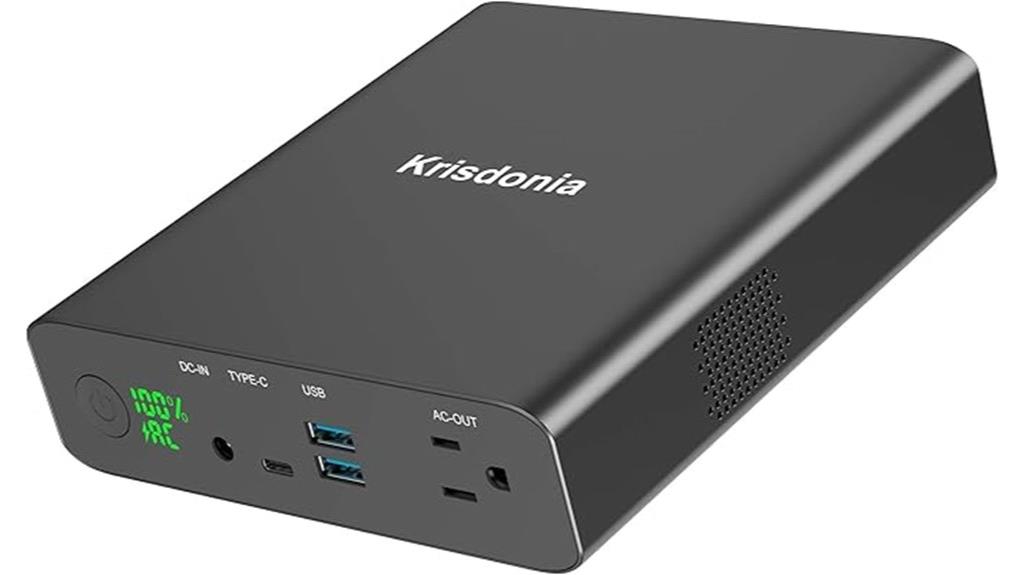
Designed for on-the-go professionals, the Krisdonia Portable Laptop Charger offers a powerful 27,000mAh capacity and up to 130W AC output, making it an ideal choice for medical personnel who need reliable, portable power during emergencies or outdoor fieldwork. It supports charging laptops, drones, projectors, and more, with fast recharging via its 19V/2A input. The device features QC 3.0 fast charging, pass-through functionality, and six safety protections, ensuring safe use. TSA-approved for travel and compact enough for portability, this power bank guarantees long-lasting, reliable power when you need it most in critical situations.
Best For: professionals, travelers, and outdoor enthusiasts who need reliable, portable power to charge multiple devices including laptops, drones, and cameras during emergencies or fieldwork.
Pros:
- Supports up to 130W AC output, capable of charging a range of high-power devices.
- TSA-approved, making it convenient for travel without restrictions.
- Features quick recharging with a 19V/2A input and pass-through charging for continuous device use.
Cons:
- Large capacity may add weight, reducing portability for some users.
- Limited to a 12-month warranty, which may be shorter than some competitors.
- Recharging time, while improved, still takes approximately 4.5 hours with included charger.
EASYLONGER CPAP Battery for Air Travel
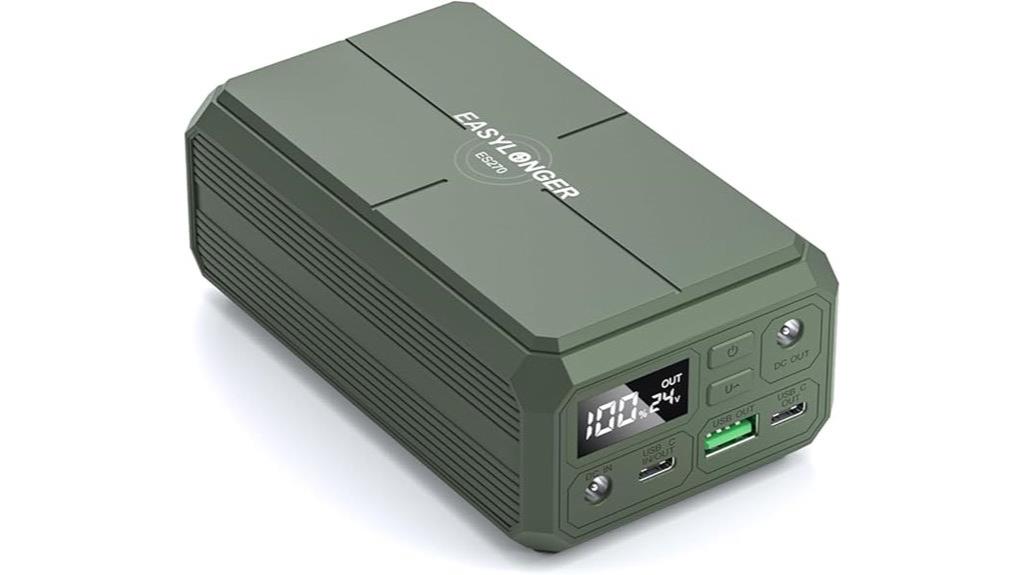
Planning for travel or outdoor adventures can be stressful if your CPAP machine’s power source isn’t reliable. The EASYLONGER ES270 CPAP Battery is airline-approved with a 99.9Wh capacity, making it perfect for air travel and outdoor use. It’s compatible with popular devices like ResMed AirMini, DreamStation, and Luna TravelPAP. It offers up to 8 hours of power (humidification off) and fast charging for laptops and smartphones. Its compact, lightweight design includes safety features like overcharge and overcurrent protection. Whether you’re flying, camping, or facing a power outage, this battery keeps your CPAP running safely and reliably.
Best For: travelers, campers, and users needing reliable, portable power for CPAP devices during air travel, outdoor activities, or power outages.
Pros:
- Airline-approved 99.9Wh capacity suitable for air travel and outdoor use
- Up to 8 hours of CPAP operation with humidification off, ensuring long-lasting power
- Fast charging with 100W PD and multiple versatile charging options, including wireless charging
Cons:
- Requires turning off humidification and heating for high-power CPAP devices to extend runtime
- Slightly larger for portable use compared to smaller battery packs (dimensions: 5.1×2.9×1.9 inches)
- Limited to low-power CPAP machines; may not support high-power models without modifications
27000mAh Portable Laptop Charger with AC Outlet (TSA-Approved)
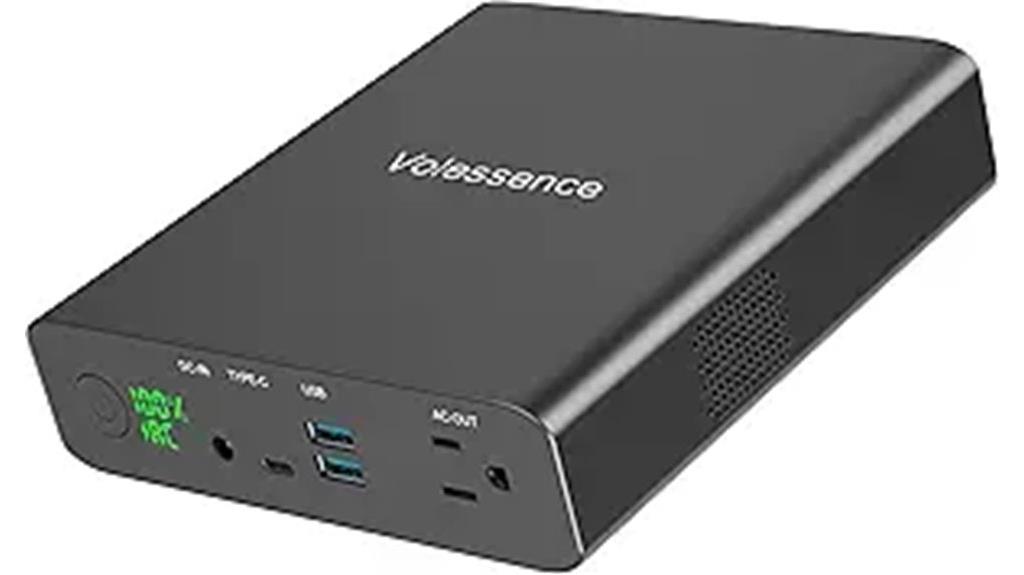
For medical professionals and emergency responders, portability and reliable power are essential, especially when working in locations without access to standard outlets. The 27000mAh portable laptop charger with an AC outlet offers a TSA-approved solution that’s perfect for travel, outdoor settings, and urgent situations. It supplies up to 130W, powering laptops, small appliances, and multiple devices simultaneously. Its compact design (6.5 x 5.9 x 1.6 inches) and light weight (2.6 lbs) make it easy to carry. With quick recharging, LED indicators, and built-in safety protections, it guarantees dependable, safe power where you need it most.
Best For: medical professionals, emergency responders, travelers, and outdoor enthusiasts who need reliable, portable power for multiple devices in locations without standard outlets.
Pros:
- TSA-approved design makes it suitable for air travel and security checkpoints
- Capable of powering multiple devices simultaneously, including laptops, small appliances, and USB devices
- Compact and lightweight for easy portability during travel or outdoor activities
Cons:
- Limited to 130W maximum output, which may not support high-power appliances
- Recharge time of 4-5 hours may be lengthy for urgent recharging needs
- Slightly heavy at 2.6 lbs, which could be a consideration for extended portable use
Zopec Explore Mini CPAP Battery UPS Backup
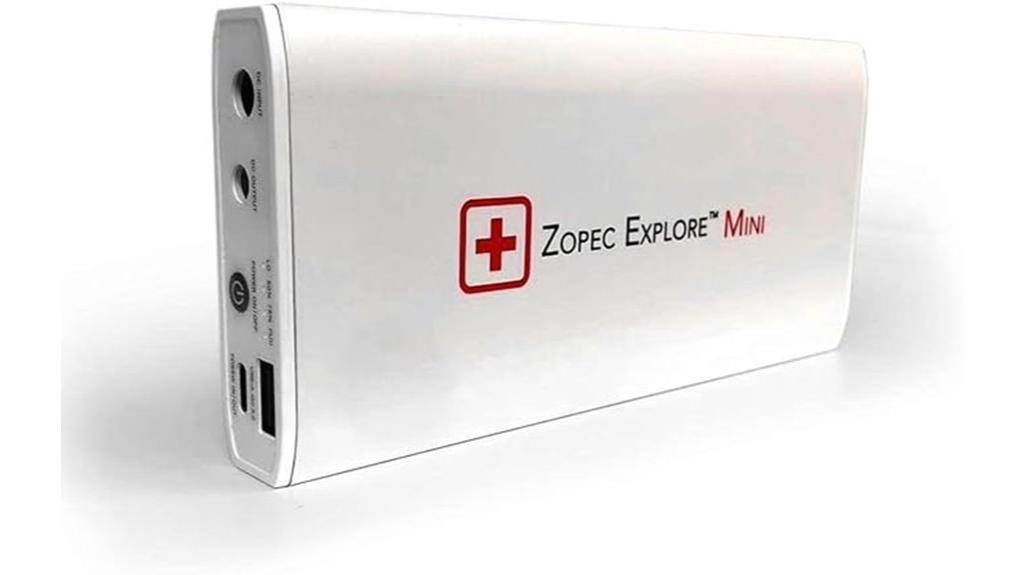
If you need a reliable backup power source for your CPAP or APAP device while traveling, the Zopec Explore Mini CPAP Battery UPS Backup is an excellent choice. Weighing just 1 pound and measuring 6.5 x 3 x 1 inches, it’s the world’s smallest and lightest travel battery. Built with Panasonic Lithium-Ion cells, it offers solid-state cooling for quieter operation. Supporting multiple voltages (24V, 12V, 19V), it’s compatible with a wide range of PAP devices, providing up to two nights of backup power. Recharging takes only 1.5 hours via USB-C, and it’s FAA-compliant for safe carry-on use, making it ideal for travel.
Best For: travelers and outdoor enthusiasts who need a compact, reliable backup power solution for their CPAP or APAP devices on the go.
Pros:
- Ultra-lightweight and portable at just 1 pound, ideal for travel.
- Supports multiple voltages (24V, 12V, 19V) for broad device compatibility.
- Recharges quickly in 1.5 hours via USB-C and provides up to two nights of backup power.
Cons:
- Limited to approximately two nights of runtime, which may not suffice for longer trips.
- Only includes basic accessories; additional cables may be needed for certain devices.
- Customer ratings are moderate, averaging 4.1 out of 5 stars, indicating some users may experience limitations.
iWALK Magnetic Power Bank 10000mAh with Wireless Charging
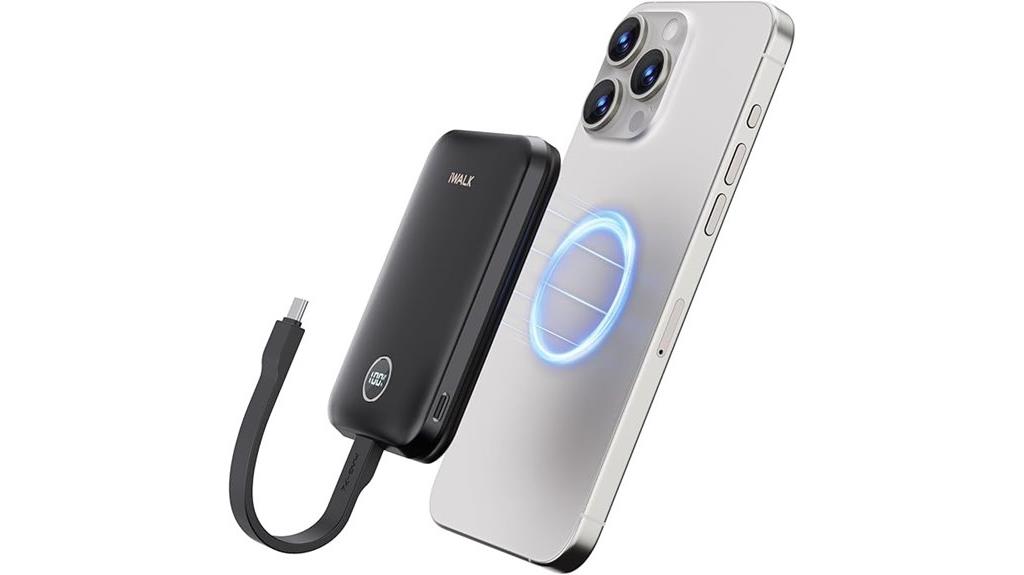
The iWALK Magnetic Power Bank 10000mAh with Wireless Charging stands out as an ideal choice for medical professionals and patients who need reliable, fast, and safe power on the go. It supports 30W PD fast charging for both input and output, charging devices up to 40% faster—just 30 minutes to reach 60% on an iPhone 15 Pro. Its Qi2 certification guarantees safe, efficient wireless charging at 15W, capable of fully charging an iPhone 15 Pro Max 1.5 times. With MagCool 2.0 cooling technology, it prevents overheating during use, making it a dependable and safe power solution for daily or travel needs.
Best For: medical professionals and patients who require fast, reliable, and safe wireless charging on the go.
Pros:
- Supports 30W PD fast charging for quick power replenishment.
- Qi2 certified 15W wireless charging ensures safe and efficient wireless power transfer.
- Equipped with MagCool 2.0 cooling technology to prevent overheating during use.
Cons:
- Limited capacity of 10000mAh may require multiple charges for high-capacity devices.
- Compatibility may vary with older or non-certified devices.
- The device’s size and weight may be less portable compared to smaller power banks.
BLUETTI CPAP Battery Backup X30 297Wh Power Supply

The BLUETTI CPAP Battery Backup X30 297Wh stands out as an excellent choice for users who need reliable power during outages or outdoor activities. With a capacity of 297Wh, it can power CPAP and BiPAP devices for 5-7 nights, making it ideal for emergencies, camping, or hurricane response. Weighing only 3.9 pounds, it’s portable with a built-in handle and accessories for easy transport. Its multiple output ports support various devices, including smartphones via USB-A. Rapid charging and safety features guarantee peace of mind. Overall, this backup power supply offers dependable, airline-friendly power for continuous device operation wherever you are.
Best For: users who need reliable, portable backup power for CPAP/BiPAP devices during emergencies, outdoor adventures, or travel.
Pros:
- Lightweight and portable at only 3.9 lbs with a built-in handle for easy transport
- Offers 297Wh capacity sufficient for 5-7 nights of CPAP/BiPAP use
- Compatible with a variety of devices and includes multiple output ports and cables for convenience
Cons:
- Limited to powering devices that are compatible with its specific output ports and wattage
- May not be suitable for high-power devices or extended outages beyond 7 nights
- The accessory bag and cables, while comprehensive, could be more durable for rough outdoor conditions
Factors to Consider When Choosing Airline-Approved Battery Packs for Medical Devices

When selecting airline-approved battery packs for medical devices, I focus on several key factors to guarantee safety and functionality. These include understanding battery capacity limits, making sure the pack complies with airline regulations, and verifying device compatibility. Additionally, I consider portability, charging options, and how quickly the battery can be recharged to meet your travel needs.
Battery Capacity Limits
Ever wondered how to guarantee your medical device’s battery pack stays within airline safety limits? The key is understanding battery capacity restrictions. Airlines typically limit carry-on batteries to 100Wh for safety reasons. Batteries between 100Wh and 160Wh might be allowed if you obtain airline approval and provide proper documentation. Anything exceeding 160Wh is generally prohibited unless specifically authorized by airline authorities. Many portable power supplies for medical devices are designed to stay within the 100Wh to 160Wh range, making them easier to bring on board. Always double-check the capacity label on your battery and review your airline’s policies before traveling. Staying within these limits helps ensure safety and smooth travel, avoiding potential delays or confiscation.
Airline Regulations Compliance
Choosing airline-approved battery packs for medical devices requires careful attention to regulations and airline policies. I always check the specific limits for lithium-ion batteries, usually capped at 100Wh for carry-on, though batteries up to 160Wh or 297Wh may be permitted with airline approval. It’s vital to carry batteries in their original packaging or a protective case to prevent short circuits during security checks. I also notify the crew if I carry large batteries and follow their procedures for onboard storage. Since batteries over 100Wh generally need airline approval, I review each airline’s policies beforehand, as some restrict or prohibit batteries over 160Wh. Additionally, I verify compliance with TSA or relevant security guidelines for labeling and documentation to avoid travel disruptions.
Device Compatibility Features
Ensuring your battery pack is compatible with your medical device is vital for safe and reliable operation during travel. First, check that the voltage, wattage, and connector type match your device’s specifications to prevent malfunctions or damage. Verify that the battery supports your device’s power requirements, such as 12V, 24V, or 130W, to guarantee it can operate effectively without underpowering. Additionally, confirm the physical size and weight fit airline carry-on regulations for portable power sources. Safety certifications, like overcharge and short-circuit protection, are indispensable for safe air travel. Lastly, choose a battery pack that is officially approved or listed as airline-safe, with proper documentation to demonstrate compliance during security checks. Proper compatibility guarantees both safety and device performance.
Portability and Size
When selecting a battery pack for travel, portability and size are key considerations to guarantee it fits comfortably in your carry-on and meets airline regulations. I look for a pack weighing no more than 3.5 pounds to ensure safety and ease of handling. Compact dimensions, ideally under 7 inches in length, help it fit easily into my bag without adding bulk. I prefer lightweight materials like lithium-ion or LiFePO4, which combine durability with minimal weight. It’s important to take into account the battery’s size relative to my carry-on to avoid cumbersome bulkiness. Additionally, I verify that the overall size allows for easy handling during security checks and in-flight use. Prioritizing compactness ensures I travel confidently without sacrificing functionality or compliance.
Charging Speed and Options
Fast charging capabilities like Power Delivery (PD) and Quick Charge (QC) are essential for minimizing downtime, especially when I need to replenish my medical device batteries quickly between uses. These technologies enable rapid recharging, so I can get back to work without long delays. I also look for battery packs that support multiple recharging options, such as AC wall adapters, USB-C PD, solar panels, or car chargers, offering versatile power sources depending on my location. Checking the watt-hour (Wh) rating helps guarantee compliance with airline regulations while providing enough runtime for my devices. Additionally, having multiple charging ports like USB-A, USB-C, or AC outlets allows me to charge different device types simultaneously. Pass-through charging is a bonus, letting me operate my device while the power bank recharges itself.
Safety and Durability
Choosing an airline-approved battery pack for my medical devices requires careful attention to safety and durability. These packs must meet strict safety standards, including protections against overcharge, over-discharge, and short circuits, ensuring safe operation during travel. I look for high-quality lithium-ion or LiFePO4 cells, known for resisting thermal runaway and ignition risks. Durability is equally important, so I choose packs that can withstand high temperatures, shocks, and vibrations common in transit. Built-in Battery Management Systems (BMS) are essential—they monitor cell health and prevent hazardous conditions. Additionally, I prioritize packs with long cycle life and stable performance over hundreds or thousands of charge cycles, providing reliable power when I need it most. Safety and durability are non-negotiable in choosing the right battery pack.
Frequently Asked Questions
What Certifications Ensure Airline Approval for Medical Device Battery Packs?
The certifications that verify airline approval for medical device battery packs include UN 38.3, IEC 62133, and UL 2054. These standards confirm safety, transportation, and performance requirements. Airlines typically require compliance with these certifications to prevent hazards during flights. I always check for these certifications before selecting a battery pack, so I can guarantee it’s safe and approved for air travel, giving me peace of mind during my journeys.
How Do Airline Regulations Vary Across Different Countries for Battery Packs?
Imagine a global map dotted with airline logos, each representing different rules. Airline regulations for battery packs vary widely; some countries demand rigorous testing and specific certifications like UN 38.3, while others have more relaxed standards. I’ve seen this firsthand when traveling. It’s essential to verify each airline’s requirements beforehand to avoid surprises. Staying informed ensures your medical device’s power source remains safe and compliant, no matter where you fly.
What Safety Features Are Mandatory for Airline-Approved Medical Device Batteries?
Mandatory safety features for airline-approved medical device batteries include robust overcharge and over-discharge protection, built-in fire-resistant casing, and secure locking mechanisms to prevent accidental disconnection. They also require compliance with international safety standards like UN 38.3 and IEC 62133. These features guarantee the batteries are safe during transport, handling, and use on flights, giving both users and airlines peace of mind.
Can These Battery Packs Be Used for Non-Medical Portable Electronic Devices?
Absolutely, you can use these airline-approved battery packs for non-medical portable devices. I’ve found they’re versatile, offering the same safety standards and reliability that make them ideal for various electronic gadgets. Just keep in mind, some airline regulations might restrict their use in certain situations. Overall, these packs are a reliable choice for anyone needing safe, portable power, whether for medical or everyday electronics.
What Is the Maximum Allowable Watt-Hour Capacity for Airline Approval?
Think of airline regulations like the golden rule—keeping everyone safe. The maximum allowable watt-hour capacity for airline approval is 100 Wh for most battery packs. If your pack exceeds this, it needs special approval or must be divided into smaller units. I recommend checking with your airline before traveling, as rules can vary. Remaining within this limit helps ensure your device’s safety and smooth travel.
Conclusion
Choosing the right airline-approved battery pack for your medical device is vital for safety and peace of mind. I always remind myself that “a stitch in time saves nine,” so investing in a reliable, certified power source now can prevent bigger issues later. Whether you’re traveling or at home, these options guarantee your device stays powered when you need it most. Prioritize safety and reliability—you’ll thank yourself every time you hit the skies.
